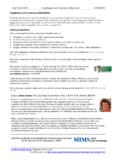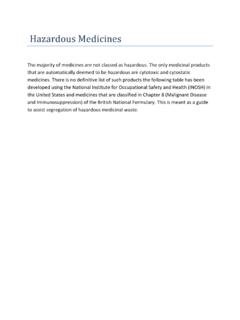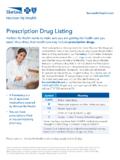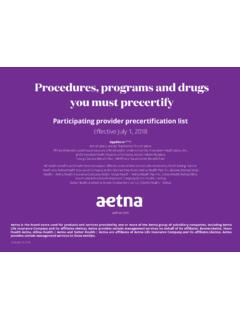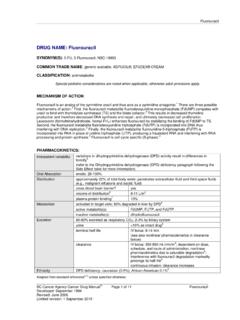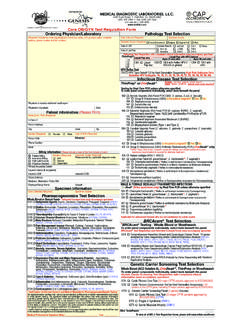Transcription of Crushing tablets – issues to consider - Auspharm
1 Crushing tablets issues to consider CE 21/10/2010. Crushing tablets issues to consider Learning objectives After completing this activity, pharmacists should be able to: Identify patients who may have swallowing difficulties List common medicines which should not be crushed Counsel patients about the risks of Crushing tablets Advise patients, doctors and Aged Care Home staff about safety and procedures to crush tablets Utilise resources to provide options for medications where Crushing is not advised **. The competency standards addressed by this activity include (but may not be limited to). , , , , , , , , , , Jenny Gowan The importance of asking questions to patients and their advocates about swallowing difficulties must be given greater priority to prevent adverse effects All pharmacists when dispensing extended release oral dose forms to older persons should check whether the patient can swallow them whole or not.
2 Opening a capsule or Crushing a tablet before administration will in most cases render its use to be unlicensed'. Crushing tablets to make them easier to swallow could make them less effective or cause a greater risk of toxicity and potential adverse effects. Many older people find it difficult to swallow medicines whole and patients or their carers in the home setting commonly crush drugs to make them easier to take. The importance of asking questions about swallowing difficulties linked with their medical conditions must be given greater emphasis by doctors, and pharmacists. Causes of dysphagia (swallowing difficulty). Age related changes are the most common cause ( cranial neuropathies from diabetes, stroke, Parkinson's disease) followed by neuromuscular disorders (eg, multiple sclerosis).
3 1,2,3 Medical conditions which cause oral mucosal disease eg xerostomia (especially Sjogren's syndrome), oral mucositis and oral candidiasis will also impact on swallowing Iatrogenic causes also contribute from drugs which cause xerostomia eg anticholinergics and diuretics, recreational drugs eg marijuana, heroin plus agents for chemotherapy and radiation therapy to the head and neck. Hyposalivation is a major cause of delayed and impaired swallowing. Dysphagia should not be confused with globus sensation, which is the sensation of the constant lump in the throat' although there is no actual difficulty swallowing food. Other conditions can cause confusion and patients present with dysphagia include dementia, depression, diabetes, other drug- induced causes, anaemia, thyroid disorders, spinal dysfunction and urinary tract ,2 Gastrointestinal reflux disease can also impact on swallowing and in severe cases Crushing tablets issues to consider CE 21/10/2010.
4 May lead to strictures causing severe dysphagia. These patients should be referred and may benefit from the use of a proton pump inhibitors (PPIs).3. Referral to a speech pathologist may be of great benefit in assessment and strategies for swallowing. Assessment of nutritional requirements is also required. Many patients suffer from dry mouth which can make swallowing very difficult. Pharmacists can advise patients to have a few sips of water first or to use a thicker fluid to swallow tablets with. [l1]Substances such as apricot puree, jam, honey, custard and yoghurt can be used in most cases. Medications which should not be taken with calcium must not be given with custard or yoghurt as per Australian Pharmaceutical Formulary (APF) Legal implications of Crushing In some cases the practice of altering the form of medication may result in reduced effectiveness, a greater risk of toxicity or an unacceptable presentation in terms of taste or texture.
5 Pharmacists should note that, once a marketed product has been altered (eg crushed), it is no longer being used in accordance with the manufacturer's Product Information' and may be considered an off-label' Prescribers and administrators of the drugs may be liable if adverse effects occur due to Crushing . Crushing medication in Aged Care Homes is a common occurrence 6 and each medication must be checked by the GP and pharmacist before unqualified staff crush medication. Authorisation must be clearly stated on the drug chart with specific directions eg swallow whole with a large glass of water or tablets to be given one by one or directions for Crushing given. A consistent approach must be used by all staff qualified or not who are giving out medications.
6 The pharmacist should be consulted. In many cases an alternative dose form may be able to be found eg, liquid, lozenges, dispersible tablets , patches or inhalers or tablets dispersed in water. In some cases medications should be discontinued and deprescribing principles used to ensure optimum quality of life for a frail older person. Pharmacies supplying Aged Care Homes or packing Dose Administration Aids (DAAs). Pharmacies packing Dose Administration Aids for Aged Care homes should be given a list of residents who require medications crushed to ensure medicines are not packed that should not be crushed. Consideration of a fixed field on dispensing programs where the pharmacist has to ask a consumer about allergies, adverse drug reactions (ADEs) or need to crush medications could assist in reduction of unwanted adverse medication events.
7 The list should be audited at regular intervals and added to resident admissions or change of status of existing residents. In Aged Care Homes a list of medications, which must not be crushed or chewed is usually provided by the pharmacist, but further education is required and team work to ensure unqualified staff giving out medicines do not crush tablets in the interest of a faster medication round. Do not crush' labels are available. Safety, stability and absorption concerns In addition to the legal implications involving modifying medicines there are important safety, stability and absorption considerations. Occupational Health & Safety: Crushing or breaking of products that are carcinogenic or teratogenic may cause a hazard to health workers because of aerolisation of particles eg azathioprine, methotrexate, Compounding pharmacies should also be aware of Crushing tablets issues to consider CE 21/10/2010.
8 Similar risks when working with tablets that may require suspending. Where possible antibiotic mixtures are preferred instead of capsules eg amoxycillin, amoxycillin/clavulanic acid, flucloxacillin etc .7, 8. Stability: Some drugs such as nifedipine are highly light sensitive and should be used without delay after Crushing . 9. Absorption issues : Many medications have an outer coating that can protect the stomach or ensure slow release of the drug, and changing it can alter its effectiveness. Crushing MS Contin (morphine, controlled release) tablets , Tegretol CR (carbamazepine controlled release) tablets and Isoptin SR ( verpamil controlled release) tablets may result in a significant risk to patient safety[l2]. 9-13 Modified release drugs with an outer coating, such as morphine or verapamil slow release, can be damaged if they are broken up, causing the patient to receive the full dose quicker than expected, and subsequently little or no dose for a period of time.
9 Many medications are formulated to release drug in a controlled manner over a defined dosing period, usually 12 or 24 hours. Crushing these medications may result in an unintended large bolus dose. Procedures for Crushing : Guidelines for Crushing medications in Aged Care Homes have been developed (5, 7, 10, 11). [l3]Equipment for Crushing medications should conform to these principles: permits complete recovery of powdered material if shared among residents it should be washed and dried after use for each resident or liners such as patty pans used in the mortar and over the pestle. The use of the mortar and pestle or plastic screw type crushers increases the possibility of different types of drugs being mixed together.
10 Nursing staff present with overuse injuries reportedly due to the use of mortar and pestles. This has lead to the development of many metal crushers available commercially to assist nursing staff.[l4]. When tablets and capsules have been authorised as safe to be are to be given at the same time: Crush tablets first Open the capsule and add the powder or pellets contained therein to the crushed tablets to prevent Crushing sustained release or enteric-coated pellets. Mix with a small amount of food that the resident likes ( jams, fruit purees). Ensure that crushed tablets or capsule contents are given to the resident as soon as possible after altering and mixing with any food or liquid to avoid reduce medication degradation and minimise risk of medication , 7 Similar protocols should be followed in the home.
